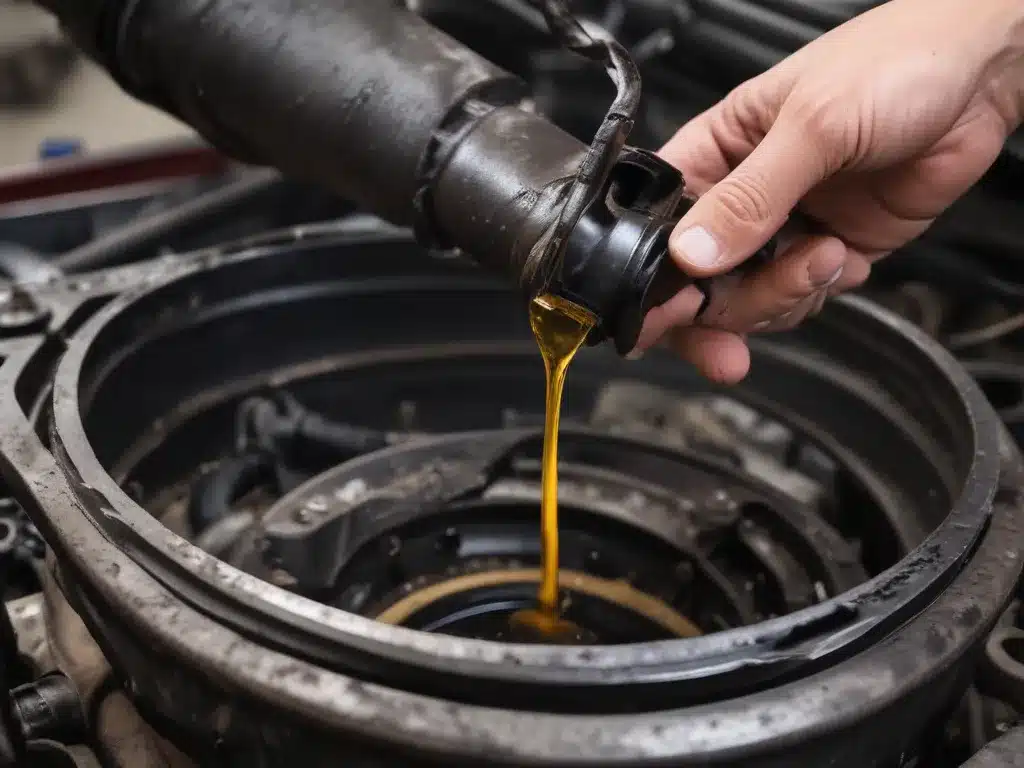
The Shocking Truth About Your Car’s Lifeblood
Ah, the humble engine oil – it’s the often-overlooked lifeblood of our beloved automobiles. As a seasoned car enthusiast, I’ve seen my fair share of mechanics who seem to have a few secrets up their greasy sleeves when it comes to this crucial fluid. But fear not, my fellow gearheads, for I’m here to peel back the curtain and reveal the shocking truth about what your mechanic might not be telling you.
First and foremost, let’s address the elephant in the room: the frequency of oil changes. I know, I know, the old adage says every 3,000 miles, but is that really necessary for every car out there? The truth is, modern engines and oil formulations have come a long way, and many manufacturers now recommend intervals of 5,000, 7,500, or even 10,000 miles between changes. But don’t just take my word for it – check your owner’s manual and see what the experts at the factory suggest. After all, they know your car better than anyone, right?
Now, let’s talk about the type of oil. Sure, the mechanic might tout the virtues of the fancy synthetic blend, but is it really worth the extra cost? Well, it depends on your driving conditions and the age of your vehicle. Newer cars with high-performance engines often benefit from the superior protection and performance of synthetic oils, but for older, more basic models, a good quality conventional oil might do the trick just fine. The key is to do your research, understand your car’s needs, and not get suckered into an unnecessary upsell.
Speaking of upsells, let’s address the elephant in the room: the dreaded “recommended service” that seems to pop up every time you take your car in. Now, I’m not saying all mechanics are shady, but let’s be honest, there’s a certain incentive for them to find all sorts of problems that need “fixing.” Take a deep breath, and don’t be afraid to get a second opinion before forking over your hard-earned cash. After all, you’re the boss when it comes to your car.
The Shocking Realities of Engine Oil
But wait, there’s more! Did you know that the type of oil you use can actually have a significant impact on your fuel economy? That’s right, folks – the viscosity and formulation of your engine oil can directly affect how much gas you’re guzzling. So, if you’re looking to eke out a few extra miles per gallon, it might be worth considering a lower-viscosity oil. Just be sure to consult your owner’s manual and do your research to make sure it’s compatible with your engine.
And let’s not forget about the often-overlooked oil filter. Sure, it’s a relatively inexpensive part, but its importance can’t be overstated. A clogged or malfunctioning oil filter can wreak havoc on your engine, leading to premature wear and even catastrophic failure. Don’t be afraid to replace it on a regular basis, even if your mechanic doesn’t mention it. After all, prevention is better than a costly repair.
Now, I know what you’re thinking: “But what about all those fancy additives and treatments the mechanic is trying to sell me?” Well, let me let you in on a little secret – most of those are just a waste of your hard-earned money. Unless you’ve got a specific problem that needs addressing, like excessive oil consumption or sludge buildup, those additives are more hype than substance. Save your cash and stick to the basics.
Putting It All Together: The Ultimate Oil Change Checklist
Alright, now that we’ve covered the shocking truths about your engine oil, let’s put it all together into a handy checklist for your next oil change:
- Check Your Owner’s Manual: Ignore the 3,000-mile rule and follow the manufacturer’s recommended oil change interval.
- Choose the Right Oil: Opt for a quality conventional oil unless your car requires synthetic. Consult your owner’s manual for the right viscosity.
- Beware the Upsell: Don’t let the mechanic talk you into unnecessary “recommended services.” Get a second opinion if you’re unsure.
- Don’t Forget the Filter: Replace the oil filter on a regular basis, even if the mechanic doesn’t mention it.
- Steer Clear of Additives: Unless you have a specific problem, those fancy treatments are probably a waste of money.
Remember, when it comes to your car’s lifeblood, knowledge is power. By staying informed and not falling for the mechanic’s tricks, you can save yourself a ton of money and keep your ride running like a well-oiled machine (pun intended).
Now, if you’ll excuse me, I’m off to change my own oil. After all, I know a thing or two that the mechanics don’t want me to tell you. Happy motoring, my fellow car enthusiasts!


